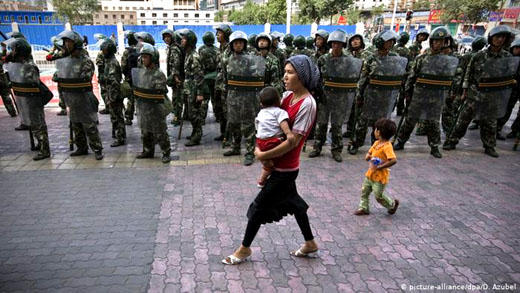Special to WorldTribune.com
Though Beijing is usually able to control or stifle the narrative inside the United Nations and many of its Committees, the oxygen of free speech on the taboo topic of human rights of China’s Muslim minority was able to seep through and be heard.
During a “High Level virtual briefing on the situation of Uyghurs and other Turkic minorities in Xinjiang,” eighteen countries as well as a group of human rights organizations held a formal meeting on a deteriorating human rights situation in China’s western region.
“The situation in Xinjiang is one of the worst human rights crises of our time. The evidence, from a growing number of credible sources… is of grave concern,” stated British Amb. Barbara Woodward. She added poignantly, “there is evidence of mass arbitrary detention, enforced disappearances and incidences of torture. There are further reports of widespread forced labour and sterilization.”

Uyghur women also face “forced birth control,” according to reports from inside the vast but isolated territory.
Indeed, evidence of a large network of “re-education camps” throughout Xinjiang show that at least one million of China’s minority Muslim citizens are incarcerated and often used for forced labor. There’s also widespread religious persecution and repression in the region by the Chinese communists. The Beijing rulers consider many ethnic Uyghurs as “terrorists” and political “separatists;” others are portrayed in a tarnished folkloric narrative as “the happy comrades of Xinjiang.”
The Canadian, Netherlands and United Kingdom parliaments have labelled Beijing’s actions against the Uyghurs as genocide.
The United Kingdom’s representative spoke for one of more than a dozen countries including the United States, France, Germany, Australia, Japan, Turkey and Slovakia who addressed the confab calling for transparency on a still largely hidden human rights situation deep inside Mainland China.
U.S. UN Amb. Linda Thomas-Greenfield stated, “We will keep standing up and speaking out until China’s government stops its crimes against humanity and the genocide of Uyghurs and other minorities in Xinjiang.”
Turkey’s delegate said the Xinjiang situation poses “a major concern for Turkey,” and such “inhuman treatment” in Xinjiang must stop. Since 1952 the Ankara government has long offered political asylum to its ethnic brethren among the Uyghur-Turks, who were fleeing Xinjiang. Indeed, there’s a 50,000 strong Uyghur community in Turkey which largely fled the region for religious and cultural persecution. Nonetheless Turkey’s authoritarian President Recep Tayyip Erdogan has cozy relations with the People’s Republic of China leading to fears among much of the diaspora of a political sellout of the ethnic Turks.
Xinjiang’s Muslim minority population faces “the systematic use of forced labor,” in particular industries such as cotton production which in turn produces about 20 percent of the world cotton output. Major fashion brands have been publicly shamed for using Xinjiang cotton in their apparel.
Kenneth Roth, Executive Director of Human Rights Watch advised, “Beijing calculates that through censorship, propaganda, intimidation, and threats, it can avoid accountability.” He added, “It has reduced the UN secretary general to a deeply disturbing silence over one of the world’s gravest human rights crimes.”
Many speakers called for transparency and for the Beijing regime to allow access to Xinjiang by international observers, especially the UN High Commission for Human Rights.
Germany’s UN Ambassador Christoph Heusgen stated clearly, “We appeal on China to respect the Universal Declaration of Human Rights and tear down the detention camps. If you have nothing to hide, why don’t you finally grant unimpeded access to the HCHR?” (High Commissioner on Human Rights).
Dolkun Isa from the World Uyghur Congress categorically called out majority Muslim countries “who should be ashamed for their silence.” Not surprisingly given their close ties with communist China, many key Muslim countries have callously looked the other way. He added the UN Secretary General Antonio Guterres, (now running for a second term and depending on China’s support) “should break his silence.”
Though the People’s Republic of China holds a permanent seat on the powerful UN Security Council it equally wields a game changing veto to any political moves which would oppose Beijing’s political interests. Thus, though getting a draft resolution through the Security Council is nearly impossible. That Great Wall should not preclude opening a transformative political debate on the persecuted Uyghurs inside UN Committees, the General Assembly and the Human Rights Committee in Geneva.
The silence of many states towards the ongoing Uyghur persecution is deafening. Breaking that silence is the first step. Then must come the transparency shedding light into the vast but politically opaque region before Xinjiang slips deeper into the darkness.
John J. Metzler is a United Nations correspondent covering diplomatic and defense issues. He is the author of Divided Dynamism the Diplomacy of Separated Nations: Germany, Korea, China (2014). [See pre-2011 Archives]

 By
By